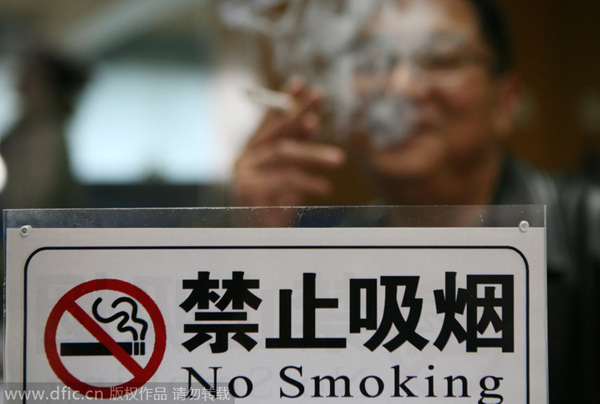High time to stub out tobacco across the country
Updated: 2015-03-07 09:15
By Bernhard Schwartlander(China Daily)
|
||||||||
 |
|
A man smokes a cigarette near a no-smoking sign in Huai'an, Jiangsu province, on Nov 25, 2014.[Photo/IC] |
As thousands of delegates converge on Beijing for the annual meetings of China's National People's Congress and the Chinese People's Political Consultative Conference National Committee this week, health is likely to feature prominently in the discussions. There are few issues that are more important to the national political agenda than the health of China's 1.36 billion people. Without health, nothing else matters.
Good health is important for individuals to live long and happy lives. This is a goal which every society aspires to for all of its citizens. Good health also means a productive workforce and a strong economy. A healthy economy is a strong economy.
This year, we hope to see NPC and CPPCC National Committee members tackle the need to break China's deadly addiction to tobacco.
China is the largest tobacco producer and consumer in the world. Nearly one-third of the world's 1 billion smokers are Chinese men. Every minute, two people in China die as a result of an illness caused by tobacco smoking. The very high rates of tobacco smoking in China, especially among men, are not consistent with the aspiration for all Chinese people to live long and happy lives. The scientific and health evidence is unequivocal. If you smoke, you will most likely die an early, and probably very painful, death.
The good news, though, is that there is a suite of policy measures which have proven effective in reducing tobacco use around the world. These policies are contained in the World Health Organization Framework Convention on Tobacco Control - the world's first health treaty. They include making all indoor public places smoke-free; warning people about the dangers of smoking tobacco - both through mass media campaigns and large, graphic warnings on tobacco packs; enacting and enforcing comprehensive bans on tobacco advertising, promotion and sponsorship; offering cessation support to smokers to quit; and increasing taxes in order to raise prices on tobacco products to make smoking less affordable, especially to young people. 2015 is the 10th anniversary of the convention coming into force, as well as the 10th anniversary of China ratifying the treaty. However, not enough progress has been made in China on implementing it.
- Global health entering new era: WHO chief
- Brazil's planning minister steps aside after recordings revelation
- Vietnam, US adopt joint statement on advancing comprehensive partnership
- European border closures 'inhumane': UN refugee agency
- Japan's foreign minister calls A-bombings extremely regrettable
- Fukushima impact unprecedented for oceans: US expert

 Stars of Lijiang River: Elderly brothers with white beards
Stars of Lijiang River: Elderly brothers with white beards
 Wealthy Chinese children paying money to learn British manners
Wealthy Chinese children paying money to learn British manners
 Military-style wedding: Fighter jets, grooms in dashing uniforms
Military-style wedding: Fighter jets, grooms in dashing uniforms
 Striking photos around the world: May 16 - May 22
Striking photos around the world: May 16 - May 22
 Robots help elderly in nursing home in east China
Robots help elderly in nursing home in east China
 Hanging in the air: Chongqing holds rescue drill
Hanging in the air: Chongqing holds rescue drill
 2.1-ton tofu finishes in two hours in central China
2.1-ton tofu finishes in two hours in central China
 Six things you may not know about Grain Buds
Six things you may not know about Grain Buds
Most Viewed
Editor's Picks

|

|

|

|

|

|
Today's Top News
Liang avoids jail in shooting death
China's finance minister addresses ratings downgrade
Duke alumni visit Chinese Embassy
Marriott unlikely to top Anbang offer for Starwood: Observers
Chinese biopharma debuts on Nasdaq
What ends Jeb Bush's White House hopes
Investigation for Nicolas's campaign
Will US-ASEAN meeting be good for region?
US Weekly

|

|









